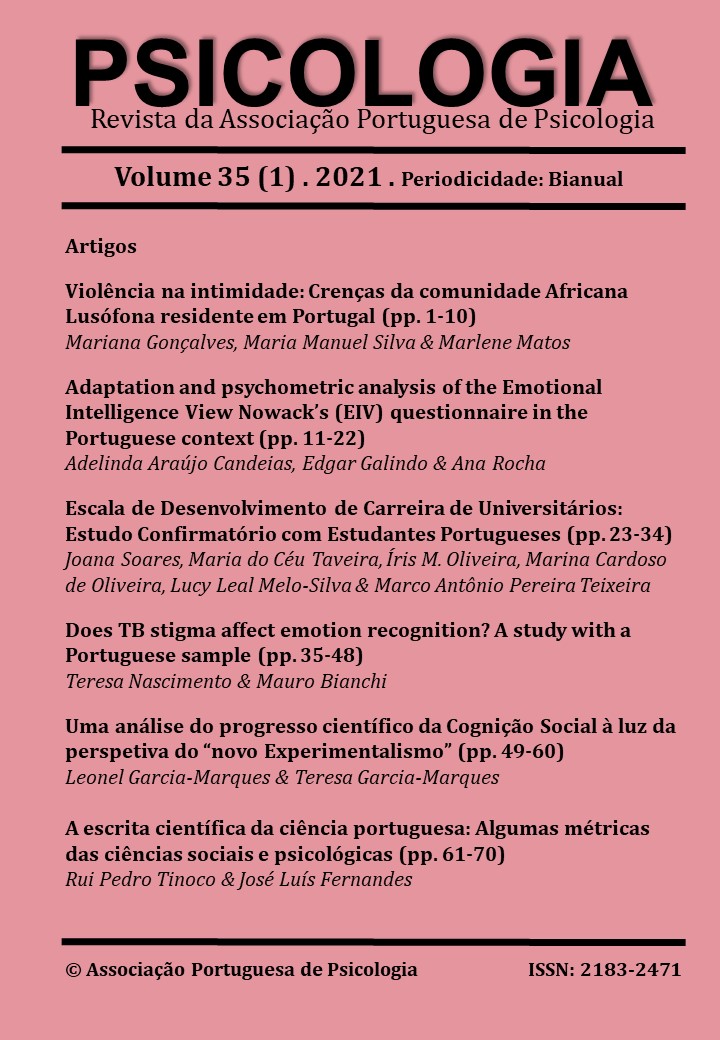Role boundary management during Covid-19 pandemic: A qualitative analysis of focus group data with working-student mothers
DOI:
https://doi.org/10.17575/psicologia.v35i1.1694Keywords:
Working-student-mothers, role boundary management, COVID-19Abstract
This qualitative study explores the experiences of role boundary management of working-student mothers during COVID-19 pandemic shelter in place order. A thematic analysis was used to examine the experiences and consequences of role blurring due to remote work, school closures, and remote learning and the strategies used to cope with the demands of three roles – being a mother, a worker, and a student. Eight participants enrolled in higher education programs participated in a focus group using Zoom technology. Several experiences of role blurring and barriers to satisfactorily manage all the roles emerged from the analysis. Strategies to cope with permanent demands seemed to have had only a small effect on working-student mothers' adjustment and well-being as they navigated through the days of shelter in place order. Implications for a better understanding of the experience and impacts of role boundary management during COVID-19 are discussed.
Downloads
References
Andrade, C., & Matias, M. (2017). Adding school to work-family balance: The role of support for Portuguese working mothers attending a master's degree. Journal of Adult and Continuing Education, 23(2), 1-20. https://doi.org/10.1177/1477971417721717
Andrade, C., van Rhijn, T., & Matias, M. (2017). School-to-Family and Family-to-School Enrichment in Women pursuing Post-Secondary Education. Revista Psychologica, 60(2), 101-116. https://doi.org/10.14195/1647-8606_60-2_6
Ashforth, B. E., Kreiner, G. E., & Fugate, M. (2000). All in a day's work: Boundaries and micro role transitions. Academy of Management Review, 25, 472–491. https://doi.org/10.5465/amr.2000.3363315
Basch, C. E. (1987). Focus group interview: An underutilized research technique for improving theory and practice in health education. Health Education Quarterly, 14(4), 411–448. https://doi.org/10.1177/109019818701400404
Braun, V., & Clarke, V. (2006). Using thematic analysis in psychology. Qualitative Research Psychology, 3, 77–101. http://dx.doi.org/10.1191/1478088706qp063oa
Braun, V., & Clarke, V. (2013). Successful Qualitative Research: A Practical Guide for Beginners. Sage.
Carnevale, J. B., & Hatak, I. (2020). Employee adjustment and well-being in the era of COVID-19: Implications for human resource management. Journal of Business Research, 116, 183-187. https://doi.org/10.1016/j.jbusres.2020.05.037
Chawla, N., MacGowan, R. L., Gabriel, A. S., & Podsakoff, N. P. (2020). Unplugging or staying connected? Examining the nature, antecedents, and consequences of profiles of daily recovery experiences. Journal of Applied Psychology, 105(1), 19 –39. https://doi.org/10.1037/apl0000423
Choy, S. (2002). Nontraditional undergraduates (Report nº NCES 2002-012). National Center for Education Statistics. https://eric.ed.gov/?id=ED546117
Cinamon, R. (2016). Integrating work and study among young adults: Testing an empirical model. Jour¬nal of Career Assessment, 24(3), 527-542. https://doi.org/10.1177/1069072715599404
Daly, K. J. (2007). Qualitative methods for family studies and human development. Sage Publications, Inc.
Home, A. M. (1997). Learning the hard way: Role strain, stress, role demands, and support in multiple-role women students. Journal of Social Work Education, 33(2), 335-347. https://doi.org/10.1080/10437797.1997.10778874
Lowe, J., & Gayle. V. (2007) Exploring the work/life/study balance: the experience of higher education students in a Scottish further education college. Journal of Further and Higher Education, 31 (3), 225-238. https://doi.org/10.1080/03098770701424942
Kreiner, G. E., Hollensbe, E. C., & Sheep, M. L. (2009). Balancing borders and bridges: Negotiating the work-home interface via boundary work tactics. Academy of Management Journal, 52, 704–730. https://doi.org/10.5465/AMJ.2009.43669916
Nippert-Eng, C. E. (1996). Home and work. The University of Chicago Press.
Oliveira, M., & Temudo, E. (2008). Mulheres Estudantes Trabalhadoras na Universidade do Porto – Uma licenciatura “fora de tempo” ou “sem tempo”? Ex-aequo, 18, 147-173.
Park, Y., & Sprung, J. M. (2013). Work-school conflict and health outcomes: Beneficial resources for working college stu¬dents. Journal of Occupational Health Psychology, 18(4), 384-94. https://doi.org/10.1037/a0033614
Raaper R., & Brown C. (2020) The Covid-19 pandemic and the dissolution of the university campus: implications for student support practice. Journal of Professional Capital and Community, 5(3/4), 343-349. https://doi.org/10.1108/JPCC-06-2020-0032
Van Rhijn, T. (2014). Barriers, Enablers, and Strategies for Success Identified by Undergraduate Student Parents. Canadian Journal for New Scholars in Education, 5(1), 1-10.
Sweet, S., & Moen, P. (2007). Integrating educational careers in work and family: Women's return to school and family life quality. Community, Work & Family, 10(2), 231-250. https://doi.org/10.1080/13668800701270166
UNESCO. (2020, September). COVID-19 Educational disruption and response. https://en.unesco.org/covid19/educationresponse
Wyland, R. L., Lester, S. W., Mone, M. A., & Winkel, D. E. (2013). Work and school at the same time? A conflict perspective of the work-school interface. Journal of Leadership & Organizational Studies, 20(3), 346-357. https://doi.org/10.1177/1548051813484360


